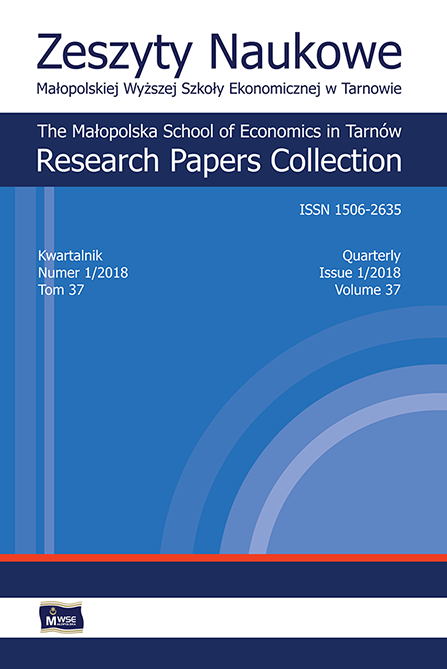Abstract
International educational tourism, realized through the Erasmus Programme, opens up the possibility of travelling abroad to study or to get some practice, promotes educational and professional mobility of students. It belongs with such human activities which are of great importance to the development of personality, self-education, getting to know oneself better in an international, culturally diversified environment. It is an element of self-creative activity of students concerning the professional aspect of their lives.
Considering the above-mentioned assumptions, the aim of the study presented in this article was to diagnose the benefits for the personal and professional development of the youth, ranging from acquiring and extending their professional knowledge to honing their personal, professional and language skills as well as their personality traits. In the examination of the role and significance of the international educational tourism in the self-creative activity of students concerning their professional lives, the diagnostic poll method was adopted and carried out with the use of the survey technique, in which the research tool was an own survey questionnaire.
From the analysis of the findings it follows that the vast majority of the respondents derived plenty of benefits for their professional development regarding a general better start in their professional career―the possibility of taking up their first job in the country or abroad. The interviewees commented positively on the practical training they were provided with by the universities abroad, the practical knowledge of the lecturers, the fact that they were open-minded and could realize the curriculum without any limitations. Additional important benefits for the scholarship students were the ability of personal and professional development, of shaping their personality and improving the skills which could be appreciated on the job market and useful in their personal life. The participants in the international educational tourism take deep satisfaction from the fact that they could participate in the Erasmus Programme which, in their opinion, has increased their value on the job market and has been an important element of their self-creative activity.
References
Adamiec, M. (1992). Podmiotowość: formy i zmiany. W: Z. Ratajczak (red). Podmiotowość człowieka. Szanse rozwoju i zagrożenia (s. 32–35). Katowice: Uniwersytet Śląski.
View in Google Scholar
Alejziak, B. (2008). Samowychowanie a turystyka. Kraków: Albis. ISBN 9788390645223.
View in Google Scholar
Angyal, A. (1969). Foundations for a Science of Personality. New York: The Viking Press.
View in Google Scholar
Antonowicz, D. (2002). Uniwersytet: od korporacji do instytucji. Zagadnienia Naukoznawstwa, 4, 513–537.
View in Google Scholar
Cvikl, H., Artič, N. (2013). Can mentors of Erasmus student mobility influence the development of future tourism? Tourism and Hospitality Management, 19(1), 83–95.
View in Google Scholar
Dhiman, M.Ch. (2012). Employers’ perceptions about tourism management employability skills. Anatolia – An International Journal of Tourism and Hospitality Research, 23(3), 359–372.
View in Google Scholar
Dolga, L., Filipescu, H., Popescu-Mitroi, M.M., Mazilescu, C.A. (2015). Erasmus mobility impact on pro¬essional training and personal development of students beneficiaries. Procedia. Social and Behavioral Sciences, 191, 1006–1013.
View in Google Scholar
Erasmus. (2011). Strona internetowa programu Erasmus [online, dostęp: 2017-12-21]. Warszawa: Fundacja Rozwoju Systemu Edukacji. Dostępny w Internecie: http://www.erasmus.org.pl.
View in Google Scholar
Fundacja Rozwoju Systemu Edukacji (2017). Strona internetowa Fundacji [online, dostęp: 2017-09-15]. Warszawa: FRSE. Dostępny w Internecie: http://www.frse.org.pl/.
View in Google Scholar
Jakowicka, M., Lewowicki, T. (red.). (1987). Aspiracje dzieci i młodzieży uczącej się w województwie zielonogórskim. Zielona Góra: Wyższa Szkoła Pedagogiczna w Zielonej Górze.
View in Google Scholar
Jančina, M., Kubicka, D. (2014). Kierowanie własnym rozwojem. Kontekst teoretyczny zjawiska. Psychologia Rozwojowa, 19(4), 31–48.
View in Google Scholar
Kozielecki, J. (2002). Transgresja i kultura. Warszawa: Wydawnictwo Akademickie „Żak”. ISBN 8386770589.
View in Google Scholar
Kryszewski, W. (2017). Uniwersytet. W: Encyklopedia [online, dostęp: 2017-12-21]. Warszawa: Wydawnictwo Naukowe PWN. Dostępny w Internecie: https://encyklopedia.pwn.pl/haslo/uniwersytet;3991404. html.
View in Google Scholar
Kunikowski, J., Kamińska, A., Gawryluk, M. (2016). Aspiracje zawodowe młodzieży. Annales Universitatis Maria Curie-Skłodowska, Lublin – Polonia, Sectio J, 29(4), 55–78. Doi 10.17951/j.2016.29.4.55.
View in Google Scholar
Lewowicki, T., Galas, B. (1984). Poziom aspiracji młodzieży. Nowa Szkoła, 9, 387–390.
View in Google Scholar
Milne, A., Cowie, J. (2013). Promoting culturally competent care: the Erasmus exchange programme. Nursing Standard, 27(30), 42–46.
View in Google Scholar
Miś, A. (2007). Koncepcja rozwoju kariery zawodowej w organizacji. Kraków: Wydawnictwo Uniwersytetu Ekonomicznego. ISBN 9788372523730.
View in Google Scholar
Obuchowski, K. (1985). Adaptacja twórcza. Warszawa: Książka i Wiedza. ISBN 8305112268.
View in Google Scholar
Obuchowski, K. (2000). Człowiek intencjonalny, czyli o tym, jak być sobą. Poznań: Dom Wydawniczy Rebis. ISBN 837301005X.
View in Google Scholar
Obuchowski, K. (2001). W poszukiwaniu właściwości człowieka. Poznań: Garmond Oficyna Wydawnicza. ISBN 839150543X.
View in Google Scholar
Pawlak, J. (2009). Autokreacja. Psychologiczna analiza zjawiska i jego znaczenie dla rozwoju człowieka. Kraków: Wyższa Szkoła Filozoficzno-Pedagogiczna Ignatianum; Wydawnictwo WAM. ISBN 9788375054286.
View in Google Scholar
Pietrasiński, Z. (1988). Rozwój z perspektywy jego podmiotu. W: M. Tyszkowa (red.). Rozwój psychiczny człowieka w ciągu życia. Zagadnienia teoretyczne i metodologiczne. Warszawa: PWN. ISBN 8301081449.
View in Google Scholar
Szubert, T. (2013). Program Erasmus w opinii polskich studentów: rok akademicki 2010/11. Warszawa: Fundacja Rozwoju Systemu Edukacji.
View in Google Scholar
Tomczak, R.T. (2015). Turystyka w dawnych czasach. Siedemnastowieczne pobyty szlachty polskiej w Pradze. Turystyka Kulturowa, 6, 6–20.
View in Google Scholar
Turos, L. (1990). Turystyka edukacyjna. Siedlce: Wyższa Szkoła Rolniczo-Pedagogiczna.
View in Google Scholar
Turos, L. (1997). Wprowadzenie do wiedzy o turystyce edukacyjnej. Warszawa: Stowarzyszenie Oświatowców Polskich. ISBN 8385135855.
View in Google Scholar
White, R.W. (1959). Motivation reconsidered: The concept of competence. Psychological Review, 66(5), 297–333.
View in Google Scholar
© Copyright by Małopolska School of Economics in Tarnów. The articles are available under the Creative Commons Attribution NonCommercial-NoDerivatives 4.0 International License


